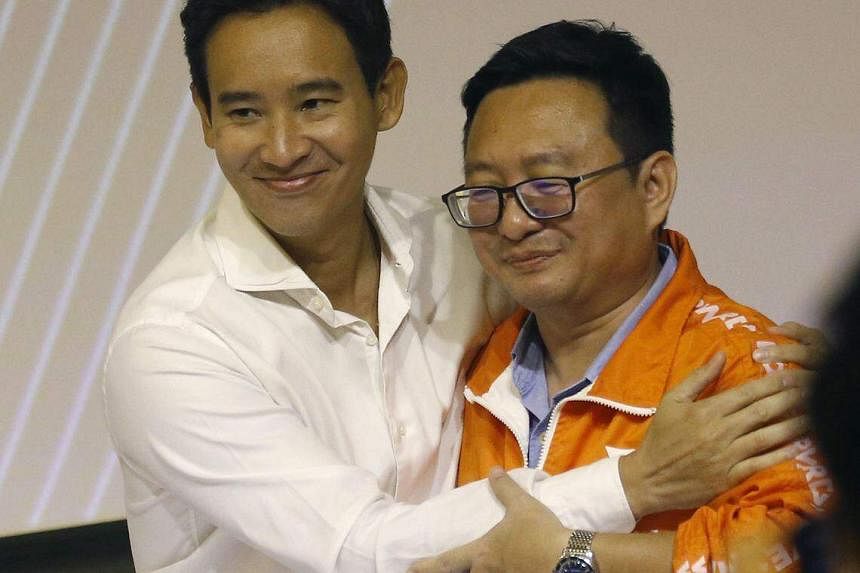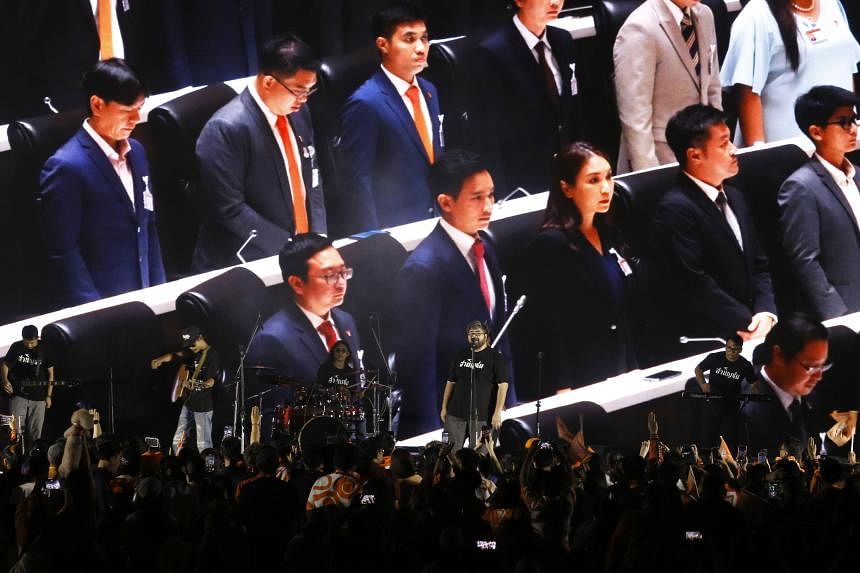BANGKOK - Winning the Thai general election on May 14 was the beginning of three months of struggle for the country’s Move Forward Party (MFP).
And returning to the familiar opposition bench is somewhat of a relief for MFP deputy leader Sirikanya Tansakul.
“It was a tough and stressful time during the negotiations,” said Ms Sirikanya, referring to the initial attempts to form a governing coalition from a provisional alliance of eight parties – led by the MFP – that lasted till July.
The coalition’s first failed attempt to elect then MFP leader Pita Limjaroenrat as premier on July 13 was “heartbreaking”, she said, since he garnered just 324 of the 375 votes needed from a joint sitting of the House and the Senate.
A second attempt to endorse Mr Pita as premier was similarly rebuffed.
This was followed by several political manoeuvres by other parties, including the Pheu Thai Party, which sidelined the MFP and eventually successfully formed the current government in August when it teamed up with the military-backed parties it had once denounced.
The MFP, which won more seats – 151 – than any other single party in the May 14 election, is back in the opposition bloc.
But it is definitely not back at square one, said Ms Sirikanya of her party, which is now the largest party in the 500-seat Lower House.
“We know that we have the support of the voters because of the (election) results. So this is a sign of hope,” said Ms Sirikanya.
The progressive MFP campaigned for social and economic reform, including making somewhat controversial promises to reform the military and amend the lese majeste law that criminalises insult to the monarchy.
While these promises – and the electorate’s desire for change after nearly a decade of military-linked rule – helped the MFP secure the largest share of the national vote, conservative lawmakers and a military-appointed senate kept the party away from the government.
The new government is currently led by Thailand’s 30th prime minister Srettha Thavisin, with the Thaksin Shinawatra-backed Pheu Thai forming the majority of the ruling coalition that includes 10 other parties.
“We are now the super majority of the opposition, and we will be even better than before,” said Ms Sirikanya.

Mr Pita resigned as MFP leader on Sept 15, and secretary-general Chaitawat Tulathon was elected as new party head.
As he is currently suspended as an MP over a pending court case regarding his alleged ownership of media shares, Mr Pita would not have been able to assume the role of opposition leader.
“We will maintain our old turf and also create new ones,” said Mr Chaitawat during a recent MFP rally. He also outlined the party’s vision to become a political institution belonging to the people.
He has said he will step down if and when Mr Pita is able to return as MFP leader.
Even with new leadership, the party will carry on with its robust questioning and thorough scrutiny in parliamentary debates, said Ms Sirikanya.
But it must also offer constructive alternatives and find ways to bring its policy initiatives to fruition.
“We will show people that we are suitable to become the government in the next election,” she said.

Looking back at the negotiation process after the MFP initiated a tentative coalition with Pheu Thai in May, Ms Sirikanya conceded that it was uncomfortable from the start. There were signs that some members of the Pheu Thai Party, which came second in the election winning 141 seats, were not eager to participate in talks.
“During negotiations over policies and budgets, it grew evident that we would not work well together,” she said.
After failing twice to garner support for Mr Pita’s bid for the premiership, the MFP decided in late July to let Pheu Thai take charge of forming the government.
“But that’s when everything flipped,” said Ms Sirikanya, referring to the July 22-23 weekend that followed the handover announcement, when Pheu Thai held marathon meetings with political parties outside the initial alliance, including lawmakers from rival conservative and military-backed parties.
The government coalition now includes the United Thai Nation party and the Palang Pracharath Party, military-linked parties whose MPs also hold Cabinet positions.
“By Monday, all signs showed that we were going to be in the opposition,” said Ms Sirikanya, referring to July 24.
Some have opined that the youthful MFP was too idealistic and naive when it came to negotiations with relatively seasoned lawmakers from other camps.
But Ms Sirikanya sees her party as being honest and sincere.
“Should we have had tricks up our sleeves, or be holding knives behind our backs? We wanted to do it the right way,” she said.
But lessons were learnt, and the party is now better prepared and more strategic, she added.
The MFP seems to be putting those learning points to use. On Thursday, it expelled its own MP, Mr Padipat Sunthiphada, so he could remain deputy House Speaker and be an MFP ally in legislative processes.
Legally, MPs in the leading opposition party cannot serve as Cabinet members or House Speakers.
Mr Padipat, who assumed the role in early July before the initial coalition fell through, is expected to join a minor opposition party within 30 days.
But just like Mr Pita’s pending court case, legal challenges await some MFP MPs and the party as a whole.
The MFP’s aim to amend the lese majeste law has led to accusations that it is trying to “overthrow the democratic system with His Majesty the King as the Head of State”.
The Constitutional Court said in July that it was looking into the case. A ruling against the party could lead to dissolution.
The MFP is planning to counter these allegations with a new version of its proposed amendments to the law to show that it does not have ill intentions, said Ms Sirikanya.
Despite its struggles, the electorate’s overwhelming support for Mr Pita and the MFP remains.
Taking time out of her three-week holiday to Thailand, nurse Atiya Cropley, 52, a Thai citizen who lives in Britain, turned up at the MFP office last week to renew her party membership.
“It’s bigger than just Pita, I support the party’s vision and its policies,” said Ms Atiya.
While she is sad that the MFP could not enter the Government House, Ms Atiya said she was hopeful Mr Pita would become Thailand’s 31st prime minister.


